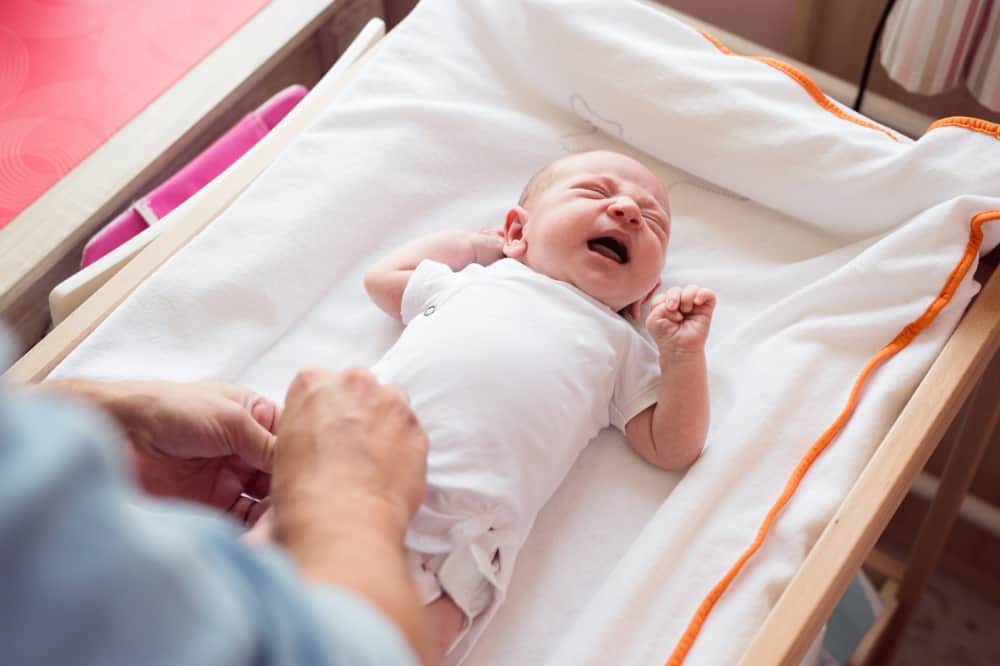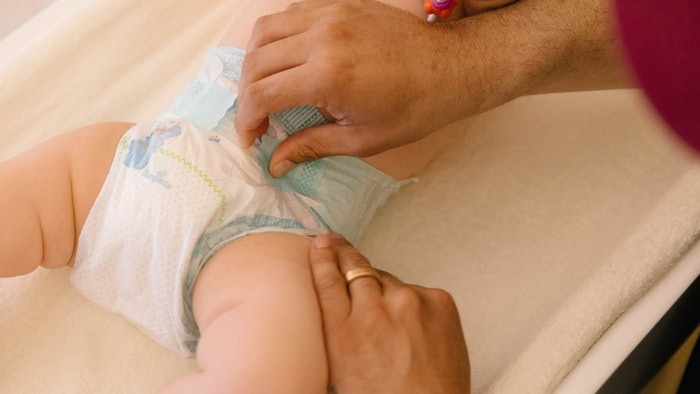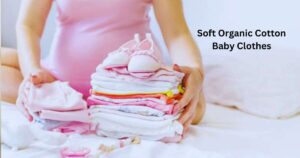Babies cry when their diaper is wet because they feel discomfort and irritation. Wet diapers can cause skin rashes and infections.
Babies have sensitive skin and a low tolerance for discomfort. Wet diapers often lead to irritation and potential diaper rash, causing babies to cry. This crying is their way of signaling a need for a diaper change. Addressing a wet diaper promptly can help maintain a baby’s comfort and prevent skin problems.
Parents should regularly check and change diapers to keep their baby dry and happy. Understanding this basic need helps in providing better care for infants. By keeping diapers dry, parents can ensure their baby feels comfortable and less fussy.
The Basics Of Baby Communication
Babies cannot talk, but they have their own ways of communicating. Understanding these methods helps caregivers respond to their needs promptly. This section explores the basics of how babies communicate, especially through crying and non-verbal cues.
Non-verbal Cues
Babies use non-verbal cues to express their needs. These cues include facial expressions, body movements, and eye contact. Recognizing these signs can help you understand why your baby is upset.
- Facial Expressions: Frowning, grimacing, or wide-eyed stares can indicate discomfort.
- Body Movements: Kicking legs, waving arms, or arching the back may signal distress.
- Eye Contact: Breaking eye contact or staring intently can also be a sign.
Paying attention to these non-verbal cues can make it easier to understand your baby’s needs.
Understanding Cries
Babies cry for various reasons, and each type of cry has a different meaning. Learning to differentiate between these cries can help you respond more effectively.
| Type of Cry | Meaning |
|---|---|
| Hunger Cry: | Rhythmic and repetitive, usually stops after feeding. |
| Wet Diaper Cry: | High-pitched and uncomfortable, often accompanied by fidgeting. |
| Tired Cry: | Whiny and occurs at regular intervals, coupled with yawning. |
| Pain Cry: | Loud and intense, may include holding breath. |
Understanding these cries helps in addressing the baby’s needs promptly. It is crucial to observe and learn what each cry means for your baby.
The Role Of Discomfort
Babies often cry when their diaper is wet. This crying serves a purpose. The role of discomfort is key in this situation. Babies feel uneasy with a wet diaper.
Physical Irritation
A wet diaper causes physical irritation on a baby’s skin. The moisture can lead to rashes. The wetness also makes the skin feel cold. Babies have sensitive skin that reacts quickly to irritation.
Here’s a simple breakdown:
| Physical Factor | Effect on Baby |
|---|---|
| Moisture | Skin irritation and rashes |
| Wetness | Cold feeling on skin |
| Sensitive Skin | Quick reaction to irritation |
Emotional Distress
Babies also cry due to emotional distress. They feel uncomfortable and unhappy. A wet diaper disrupts their sense of security. Babies rely on parents to fix their discomfort.
Here are some reasons for their distress:
- Feeling of discomfort
- Sense of insecurity
- Need for parental attention
Hygiene And Skin Health
Babies have sensitive skin. When their diaper is wet, they feel discomfort. Wet diapers can lead to skin problems. Keeping your baby’s skin healthy is crucial. This involves maintaining proper hygiene.
Wet diapers can cause rashes and infections. Babies cry to signal this discomfort. Ensuring your baby’s diaper is dry helps in keeping their skin healthy.
Preventing Diaper Rash
Diaper rash can make your baby very uncomfortable. The rash appears as red patches on the skin. To prevent diaper rash, change diapers frequently.
| Action | Benefit |
|---|---|
| Change diapers often | Reduces skin irritation |
| Use rash cream | Protects baby’s skin |
| Ensure proper diaper fit | Prevents chafing |
Importance Of Dryness
Keeping your baby’s diaper dry is vital. A dry diaper maintains comfort and prevents infections. Wet diapers can cause skin irritation.
Here are some tips to ensure dryness:
- Check the diaper every two hours.
- Change diapers immediately when wet.
- Use high-absorbency diapers.
- Let your baby’s skin air out between changes.
Psychological Factors
Understanding why babies cry when their diaper is wet involves more than just physical discomfort. Psychological factors also play a significant role. Babies are sensitive to their environment and their emotional well-being can affect their reactions. Let’s delve deeper into some of the key psychological factors that contribute to this behavior.
Sense Of Security
Babies feel secure when they are clean and dry. A wet diaper can disrupt this sense of security. The discomfort of a wet diaper can make babies feel vulnerable and exposed.
They rely on their parents to maintain their comfort. When this comfort is compromised, it triggers crying. This is their way of alerting you to the issue. Ensuring a dry diaper helps maintain their sense of security.
Parent-child Bonding
Crying due to a wet diaper can also strengthen the parent-child bond. When a baby cries and the parent responds, it builds trust. The baby learns that their needs will be met.
This interaction is crucial for emotional development. Each time you change a wet diaper, you are reinforcing this bond. Your baby feels loved and cared for, which is essential for their growth.
Responding promptly to a wet diaper can also reduce crying episodes. This creates a more peaceful environment for both the baby and the parents.
In summary, understanding these psychological factors can help parents respond better to their baby’s needs. It’s not just about keeping them dry, but also about nurturing their emotional well-being.
Physiological Responses
Babies cry when their diaper is wet due to natural physiological responses. These responses help them communicate discomfort and ensure their needs are met. In this section, we’ll explore the sensory reactions and the role of the nervous system in this process.
Sensory Reactions
Babies have a heightened sense of touch. Wet diapers cause a cold, clammy feeling. This sensation is uncomfortable and can lead to crying. Additionally, the wetness can irritate their skin, causing further discomfort.
Key points:
- Heightened sense of touch
- Cold, clammy feeling from wet diapers
- Skin irritation
Nervous System Role
The nervous system plays a crucial role in how babies respond. Sensory receptors in their skin detect wetness and send signals to the brain. The brain then processes these signals, leading to crying as a response.
How it works:
- Sensory receptors detect wetness.
- Signals sent to the brain.
- The brain processes the signals.
- Crying is triggered.
This process ensures that caregivers are alerted quickly. It is an essential survival mechanism for infants.

Credit: momlovesbest.com
Parental Responses
Parents often feel anxious when their baby cries due to a wet diaper. Knowing how to respond can make a significant difference. Both immediate actions and long-term strategies are crucial for soothing your baby.
Immediate Actions
When your baby starts crying, check the diaper first. A wet diaper can cause discomfort and lead to irritation. Here are some immediate steps to take:
- Gently lay your baby on a changing mat.
- Unfasten the dirty diaper and wipe the area clean.
- Use baby wipes that are free from alcohol and fragrances.
- Apply a diaper rash cream if needed.
- Secure a fresh diaper snugly but not too tight.
These steps ensure your baby feels dry and comfortable again. Always keep a stock of diapers and wipes handy.
Long-term Strategies
Long-term strategies help minimize frequent crying episodes due to wet diapers. Here are some effective approaches:
- Regular Diaper Checks: Check the diaper every two to three hours.
- Quality Diapers: Invest in high-absorbency diapers to keep your baby dry.
- Nighttime Solutions: Use overnight diapers for extra absorbency.
- Skin Care: Keep the diaper area clean and dry to prevent rashes.
- Hydration: Ensure your baby is well-hydrated but not over-hydrated.
Implementing these strategies can help keep your baby comfortable and reduce crying episodes.
Impact On Sleep Patterns
Wet diapers can affect a baby’s sleep. Babies feel discomfort when their diaper is wet. This discomfort can wake them up. Understanding how wet diapers impact sleep helps parents provide better care.
Disrupted Sleep
Babies need a lot of sleep. A wet diaper can interrupt this sleep. When a baby wakes up due to a wet diaper, they may cry. This crying can keep them awake longer. The baby may struggle to fall back asleep.
Interrupted sleep can make babies cranky. They might feel tired during the day. Parents also experience disrupted sleep. They need to wake up to change the diaper. This affects the entire family’s sleep quality.
Creating A Comfortable Environment
A comfortable environment can help babies sleep better. Here are some tips:
- Use high-quality, absorbent diapers.
- Check and change the diaper frequently.
- Ensure the baby’s sleeping area is dry and clean.
- Keep the room temperature comfortable.
- Use gentle lighting to soothe the baby.
A dry diaper helps the baby stay asleep longer. Parents should also maintain a consistent bedtime routine. This can include a warm bath, a gentle massage, or a bedtime story.
| Tips | Benefits |
|---|---|
| Use high-quality diapers | Better absorption, less discomfort |
| Change diapers frequently | Reduces the chance of waking up |
| Maintain a clean sleeping area | Promotes uninterrupted sleep |
| Comfortable room temperature | Helps the baby sleep peacefully |
| Gentle lighting | Soothes the baby back to sleep |

Credit: babygooroo.com
Technological Solutions
Parents often face the challenge of a crying baby due to wet diapers. Modern technology offers new ways to address this issue. Smart diapers and monitoring devices can help you keep your baby dry and happy.
Smart Diapers
Smart diapers are equipped with sensors. These sensors detect moisture levels. When the diaper is wet, the sensor sends an alert. This helps parents change the diaper promptly. It reduces discomfort for the baby.
Smart diapers can also track urine output. This data can be shared with pediatricians. It helps in monitoring the baby’s health. Some smart diapers even come with an app. The app stores data and provides useful insights.
| Features | Benefits |
|---|---|
| Moisture Sensors | Alerts parents to wetness |
| Data Tracking | Monitors baby’s health |
| Mobile App | Provides insights and data storage |
Monitoring Devices
Monitoring devices can be attached to regular diapers. These devices work similarly to smart diapers. They notify parents when the diaper is wet. Some can even monitor the baby’s sleeping patterns.
Monitoring devices offer real-time alerts. This ensures quick action. Parents can keep track of diaper changes easily. These devices are usually small and easy to use.
- Easy to attach to any diaper
- Real-time notifications
- Tracks sleep and wetness

Credit: www.memorialcare.org
Frequently Asked Questions
Why Do Babies Cry When Their Diaper Is Wet?
Babies cry when their diaper is wet because they feel discomfort. Wet diapers can cause irritation and rashes. This can make them fussy. Changing their diaper keeps them dry and comfortable.
How Can You Tell If A Diaper Is Wet?
You can tell if a diaper is wet by checking its heaviness. Most diapers have a wetness indicator. This changes color when wet. Always check regularly to keep your baby comfortable.
What Are The Signs Of A Wet Diaper?
Signs of a wet diaper include fussiness and crying. The diaper may feel heavy or sag. Some diapers have a color-changing strip. This can signal wetness.
How Often Should You Change A Wet Diaper?
You should change a wet diaper every 2-3 hours. Newborns may need more frequent changes. Regular changes prevent rashes and discomfort. Always check the diaper during feedings and naps.
Conclusion
Understanding why babies cry when their diaper is wet helps parents respond quickly. Addressing this discomfort ensures a happier baby. Always check and change diapers regularly. Keep your baby clean and dry for their well-being. Remember, a dry baby is a happy baby, leading to fewer cries and more smiles.




